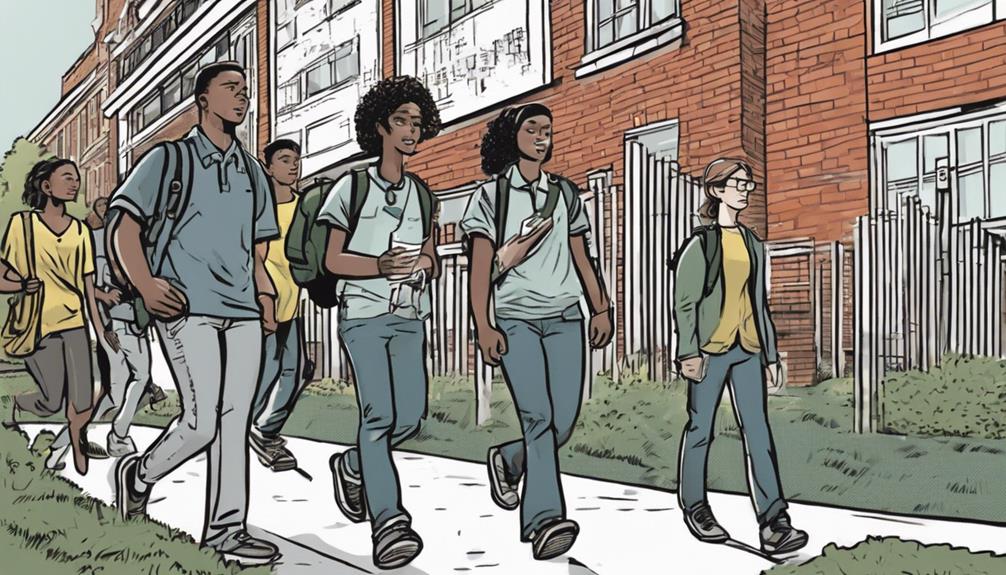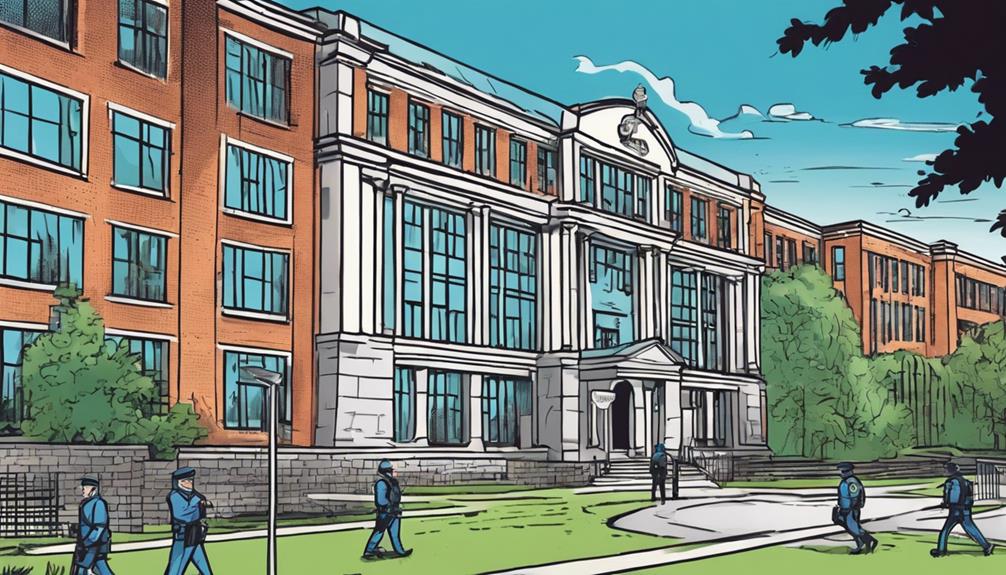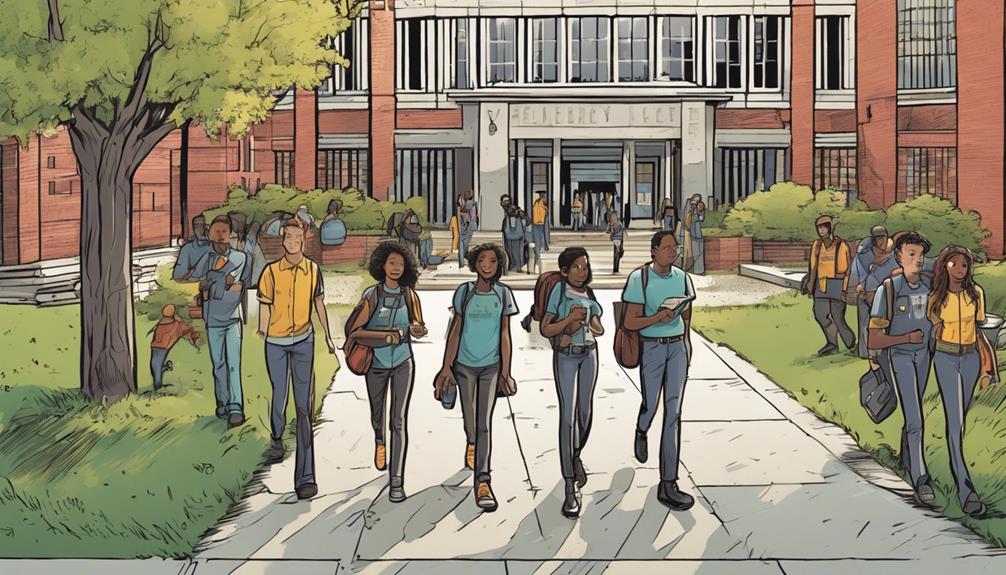Campus security is the linchpin of student safety, ensuring a nurturing and secure educational setting. Robust security measures, like access control systems and surveillance monitoring, cultivate an environment conducive to learning and personal growth. Security personnel, emergency response plans, and collaboration with law enforcement form a safety net against potential threats, offering peace of mind for the academic community. Prioritizing campus security not only deters crime but also safeguards property and enhances emergency preparedness. By focusing on campus security, students, lecturers, and staff can thrive in a protected and tranquil atmosphere, fostering a harmonious schooling environment.
Key Takeaways
- Robust campus security measures deter threats and safeguard student well-being.
- Effective security protocols create a safe learning environment for students.
- Timely response from security personnel prevents crimes and ensures student safety.
- Emergency preparedness plans guarantee structured crisis response for student protection.
- Promoting peace of mind through security measures enhances student focus on academic pursuits.
Importance of Campus Security

Ensuring robust campus security measures is vital to safeguarding the well-being and academic pursuits of students, faculty, and visitors within educational institutions.
By implementing effective security protocols, educational facilities create a safe environment that fosters learning and growth. Features such as access control systems, security personnel presence, surveillance monitoring, and efficient emergency response plans are essential components of campus security. These measures not only deter potential threats but also provide a sense of security and peace of mind for everyone on campus.
Maintaining a secure campus environment allows students to focus on their studies without the distraction of safety concerns. Ultimately, prioritizing campus security is necessary for creating a conducive learning environment where students can thrive and excel.
Role in Crime Prevention

A proactive approach to campus security plays a crucial role in preventing criminal activities that can disrupt educational operations and jeopardize the safety of individuals on campus.
Campus security contributes immensely to crime prevention through:
- Increased Visibility: Security patrols and monitoring systems create a visible deterrent to potential criminals.
- Timely Response: Quick reaction from security personnel can prevent crimes from escalating.
- Collaboration with Law Enforcement: Working closely with local authorities enhances crime prevention efforts and guarantees a coordinated response to security threats.
Ensuring Emergency Preparedness

Campus security plays a critical role in preparing educational facilities to respond effectively to emergencies and safeguard the safety of individuals on campus. Guaranteeing emergency preparedness involves implementing robust systems and procedures to handle various crisis situations promptly. Here is a table highlighting key components of emergency preparedness on campus:
| Emergency Preparedness Components | Benefits |
|---|---|
| Emergency Response Plans | Guarantees a structured and efficient response to crises |
| Regular Training for Staff and Students | Increases awareness and preparedness for emergencies |
| Communication Systems | Facilitates quick dissemination of information during crises |
| Emergency Drills | Helps practice response procedures for different scenarios |
| Collaboration with Local Authorities | Enhances coordination for effective emergency response |
Significance of Property Protection

Security measures aimed at safeguarding valuable assets within educational facilities are essential for maintaining a secure and conducive learning environment. Campus property protection not only guarantees the safety of assets but also contributes to the overall well-being of the academic community.
- Implementing access control systems to regulate entry and exit points.
- Utilizing surveillance cameras to monitor and deter unauthorized activities.
- Employing security patrols to provide a visible presence and prompt response to security incidents.
Promoting Peace of Mind

Ensuring a sense of safety and tranquility within educational environments is essential for fostering a conducive atmosphere for learning and personal growth. Campus security plays a vital role in promoting peace of mind for students, lecturers, and staff.
By implementing access control measures, monitoring systems, and security personnel, educational institutions create a secure environment where individuals can focus on their academic pursuits without safety concerns. Feeling safe on campus allows students to engage more effectively with their coursework, leading to successful learning outcomes.
Additionally, managing who enters and exits the premises through security protocols helps prevent common campus crimes like burglary, theft, assault, harassment, and cybercrimes, contributing to a harmonious and secure schooling environment.
Frequently Asked Questions
How Can Students Report Suspicious Activity on Campus?
To report suspicious activity on campus, students should promptly notify campus security or authorities. Encouraging vigilance and communication within the community is essential. Campus security relies on student involvement to maintain a safe learning environment.
What Measures Are in Place to Handle Medical Emergencies?
Measures in place to handle medical emergencies on campus include prompt response by trained security personnel, immediate alert systems to local responders, and coordination with emergency services. Ensuring quick and effective responses is essential for student safety.
Is Campus Security Available 24/7 for Assistance?
Campus security is available 24/7 for immediate assistance. Trained personnel and monitoring systems guarantee prompt response to emergencies, including medical incidents, natural disasters, or threats. Access control and surveillance maintain a safe environment round-the-clock to protect the campus community.
Are There Specific Protocols for Handling Active Threats?
In the event of an active threat, campus security follows specific protocols to guarantee a swift and coordinated response. From immediate alert systems to evacuation procedures, these measures are essential in mitigating risks and safeguarding lives.
How Often Are Security Drills Conducted for Students and Staff?
Security drills for students and staff are conducted regularly to guarantee preparedness for emergencies. Timely drills enhance response efficiency and familiarize individuals with emergency procedures. Practice scenarios include fire evacuations, active shooter situations, and natural disasters, promoting a safe campus environment.
Conclusion
In summary, campus security plays an essential role in safeguarding the well-being of students, staff, and visitors.
One interesting statistic to note is that according to the National Center for Education Statistics, 94% of public schools reported that they controlled access to school buildings by locking or monitoring doors during school hours.
This highlights the widespread recognition of the importance of security measures in educational settings to guarantee a safe and conducive learning environment for all.










